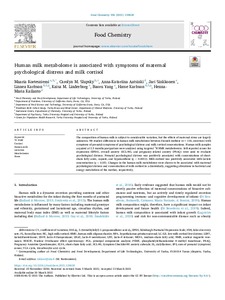Hae
Aineistot 1-2 / 2
Anthocyanin-rich extract from purple potatoes decreases postprandial glycemic response and affects inflammation markers in healthy men
<p>Our recent clinical study suggested that polyphenol-rich purple potatoes lowered postprandial glycemia and insulinemia compared to yellow potatoes. Here, 17 healthy male volunteers consumed yellow potatoes with or without purple potato extract (PPE, extracted with water/ethanol/acetic acid) rich in acylated anthocyanins (152 mg) and other phenolics (140 mg) in a randomized cross-over trial. Ethanol-free PPE decreased the incremental area under the curve for glucose (p = 0.019) and insulin (p = 0.015) until 120 min after the meal, glucose at 20 min (p = 0.015) and 40 min (p = 0.004), and insulin at 20 min (p = 0.003), 40 min (p = 0.004) and 60 min (p = 0.005) after the meal. PPE affected some of the studied 90 inflammation markers after meal; for example insulin-like hormone FGF-19 levels were elevated at 240 min (p = 0.001). These results indicate that PPE alleviates postprandial glycemia and insulinemia, and affects postprandial inflammation.<br></p>...
Human milk metabolome is associated with symptoms of maternal psychological distress and milk cortisol
<p>The composition of human milk is subject to considerable
variation, but the effects of maternal stress are largely unknown. We
studied differences in human milk metabolome between Finnish mothers (n = 120,
secretors) with symptoms of prenatal symptoms of psychological distress
and milk cortisol concentrations. Human milk samples acquired at
2.5 months postpartum were analyzed using targeted <sup>1</sup>H NMR metabolomics.
Self-reported scores for depression (EPDS), overall anxiety (SCL-90),
and pregnancy-related anxiety (PRAQ) were used to evaluate psychological
distress. Prenatal psychological distress was positively associated
with concentrations of short-chain fatty acids, caprate, and
hypoxanthine (q < 0.0012). Milk cortisol was positively associated with lactate concentration (q < 0.05).
Changes in the human milk metabolome were shown to be associated with
maternal psychological distress and concentration of milk cortisol in a
dissimilarly, suggesting alterations in bacterial and energy metabolism
of the mother, respectively.</p>...

